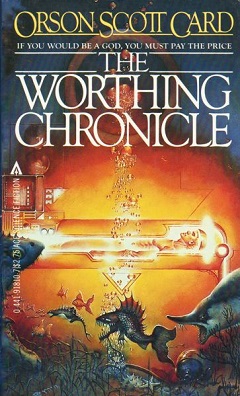 First edition | |
| Author | Orson Scott Card |
|---|---|
| Cover artist | Don Maitz |
| Language | English |
| Series | The Worthing series |
| Genre | Science fiction |
| Publisher | Ace Books |
Publication date | 1983 |
| Publication place | United States |
| Media type | Print (hardback & paperback) |
| Pages | 272 |
| ISBN | 0-441-91810-7 |
| OCLC | 9980726 |
The Worthing Chronicle (1983) is a science fiction novel by American writer Orson Scott Card, part of The Worthing series. This book by itself is out of print having been published along with nine short stories in the collection The Worthing Saga (1990).